
Intro about the band
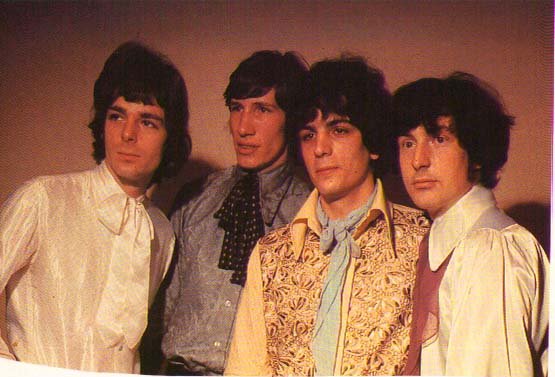 Pink Floyd has revolutionized the way that
the world looks at music. As pioneering users of stage lighting, quadrophonicconcerts,
theatrical stage shows and a hundred and one techincal and artistic innovations, the band never
accepted the words "can't be done" from their collaborators. Such eagerness
to embrace the new would be empty bravado, were it not matched with thoughful, meaningful
lyrics and stories, exquisite musicianship and, not least, damn fine tunes. That's not to say
there haven't been lapses, they have had their share if turkeys; but even these have been
produced with style. The message of the Floyd has been varied, but the soul-filled meaning
behind it has always remained intact. From their beginnings as an improvising, blues based
psychedelic band with hit pop singles to a period when every other journalist insisted,
mistakenly, in describing them as "eclcetronic rockers"; from the ubiquitous
'Dark Side Of The Moon' to being the first rock band played in space; from losing not one but
two key members to performing a two hundred date stadium tour; from an underwear theif and
'Several Species Of Small Furry Creatures Gathered Together In a Cave And Grroving With A Pict'
to the doom and gloom of 'The Wall', Pink Floyd have always been bigger, better and braver than
the rest. Need I say more? ....
Pink Floyd has revolutionized the way that
the world looks at music. As pioneering users of stage lighting, quadrophonicconcerts,
theatrical stage shows and a hundred and one techincal and artistic innovations, the band never
accepted the words "can't be done" from their collaborators. Such eagerness
to embrace the new would be empty bravado, were it not matched with thoughful, meaningful
lyrics and stories, exquisite musicianship and, not least, damn fine tunes. That's not to say
there haven't been lapses, they have had their share if turkeys; but even these have been
produced with style. The message of the Floyd has been varied, but the soul-filled meaning
behind it has always remained intact. From their beginnings as an improvising, blues based
psychedelic band with hit pop singles to a period when every other journalist insisted,
mistakenly, in describing them as "eclcetronic rockers"; from the ubiquitous
'Dark Side Of The Moon' to being the first rock band played in space; from losing not one but
two key members to performing a two hundred date stadium tour; from an underwear theif and
'Several Species Of Small Furry Creatures Gathered Together In a Cave And Grroving With A Pict'
to the doom and gloom of 'The Wall', Pink Floyd have always been bigger, better and braver than
the rest. Need I say more? ....
last word about the band
The band has a large and loyal following, and kept the albums selling in phenomenal
quantities, because of combination of factors - the innovations, the attention to small detail
and quality, the supberb music, the cleverness of concepts and their relevance to everyday life
(then and today), the mystery that grew around their reluctance to be photographed or interviewed
for much of the Seventies, the lack of singles during the same crucial period, the imaginative
album packaging, the crisp live sound, the spectacular theatrical shows - and, of course, a
special magic that cannot be copied no matter how much money or equipment is available.
History of the band
Dave Gilmour, Syd barrett and Roger Waters (and, several other people associated with the band) all knew each other from their school days in the early sixties in Cambridge. While Gilmour spent his late teens years busking and gigging in France and Northern Spain, Barrett attended college in Cambridge and Waters studied in London, where he met fellow architecture students Nick Mason, son of a well-known director of motoring films, and Rick Wright, a part trained classical musician with jazz tendencies.
The band formed in 1965 when (Roger Waters, Rick Wright and Nick Mason) decided to cover some R&B songs. They called themselves Sigma 6. They played under many names, such as The T-Set, The Meggadeaths, The Architectural Abdabs, and The Screaming Abdads, Leonard's Lodgers. Their journey had begun but the success still eluded them.
Later that year Waters, thinking they needed a new sound, brought in a friend from High School Syd Barrett, who was also now in London, his artistic talents having earned him a place on a painting course. Barrett gave them the name we all know them by now, Pink Floyd (actually "The Pink Floyd Sound"), after two American Blues musicians, Pink Anderson and Floyd Council.
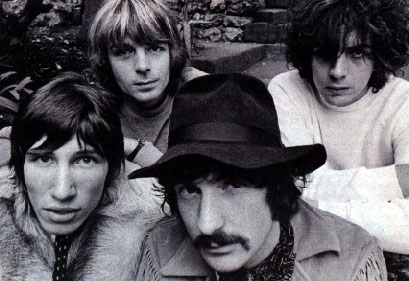 As their confidence grew, they went on from R&B covers, pop to their own extended
psychedelic improvisations, they would often play very extended versions of songs, like a
forty minute version of "Interstellar Overdrive", loved by the freaks of the emerging
underground movement in London, but hated by straighter concert goers. Syd Barrett began
to show his creative genius in lyrical, and sometimes witty ways. The psychedelic and mesmerising
music in the intial albums were a proof of this.
As their confidence grew, they went on from R&B covers, pop to their own extended
psychedelic improvisations, they would often play very extended versions of songs, like a
forty minute version of "Interstellar Overdrive", loved by the freaks of the emerging
underground movement in London, but hated by straighter concert goers. Syd Barrett began
to show his creative genius in lyrical, and sometimes witty ways. The psychedelic and mesmerising
music in the intial albums were a proof of this.
The band's popularity was ever growing. While playing in the underground London club scene, it wasn't too uncommon to see The Floyd headlining with the likes of Jimi Hendrix. Their first released single was "Arnold Layne", it rapidly flew up the charts.
The band reveled in their newfound popularity. All this time, the one secret the band had been trying to keep from their public was the fragile state of Syd Barrett's mental health and his impending breakdon. He was drawing apart from the band and he regularly lost himself in LSD daydreams. Towards the end of his stay with Pink Floyd, he was known to stand on stage strumming a single chord while staring into the lights, or just to detune his guitar while playing. It is also said that the band would have to take him offstage at the end of a concert and wipe the drool from his mouth. This was rapidly becoming too much for the rest of the band. Syd had to go.
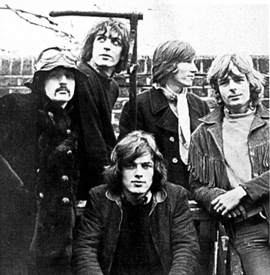 The search for a new guitarist was something that the band thought would
take the popularity from them that they had. Roger Waters wanted to
initially ask Jeff Beck to take over for Syd, but was afraid he'd say no.
It finally came down to the band taking in long time friend and folk-blues
guitarist, David Gilmour - would replace him for live work, with Barrett retaining reponsibility
for writting, but only a handful of gigs were performed as a five piece. Syd Barrett
reluctantly left the band, and was checked into a sanitarium a short time later.
The search for a new guitarist was something that the band thought would
take the popularity from them that they had. Roger Waters wanted to
initially ask Jeff Beck to take over for Syd, but was afraid he'd say no.
It finally came down to the band taking in long time friend and folk-blues
guitarist, David Gilmour - would replace him for live work, with Barrett retaining reponsibility
for writting, but only a handful of gigs were performed as a five piece. Syd Barrett
reluctantly left the band, and was checked into a sanitarium a short time later.
The band had a new problem before them, and that was finding their style of music. The first few years from this new lineup revealed a diversity in music that has to be heard to be believed. After doing a couple of soundtracks for foreign films, the band released "Meddle". It is from this very album that the well known sounds of Pink Floyd started to develop. And they have always bettered themselves.
Picture below is a scan from the Meddle CD booklet.
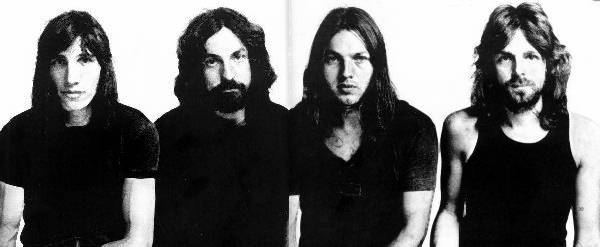
Through the early seventies, the band gained a larger and larger foreign audience - namely in the United States. In 1973, their fame began to apex with the release of "Dark Side of The Moon". This new project showed a different band. All members of the band had matured artistically since they had first played together nearly a decade before. Waters had become an accomplished lyricist, and Gilmour had become a much respected guitarist. And it was these two prevelant personalities that would come to odds with each other the most.
The idea of linking song with themes of madness, agening, work and death - worries that trouble everyone of us - came about in a band meeting in Mason's kitchen. It still has relevance today. No wonder, statistically be playing somewhere or other on the palnet during every momment of every day.

It was also at this time that the band began to know what fame and fortune can bring, tension. It started to become apparent that there was a struggle between Roger Waters and the rest of the band. He threatened to walk out on the recording of the album, and also on the following tour.
Following 'Dark Side Of The Moon' was going to be a problem, but then being the band they are, the band started to record the classic, "Wish You Were Here". It was released in 1975. David Gilmour later speaks of this album as being a "Thank You" to Syd Barrett for his guidance and wisdom in the early years of the band. Much to everyone's surprise, Barrett showed up in the middle of recording, nearly seven years after leaving the band. He no longer resembled the sheik looking rock star he once was, though. He had lost most of his hair, put on much weight, and didn't seem to have the same personality. Needless to say, this was very inspirational to the band and it can be heard in every song off of that album.
In 1976, "Dark Side of The Moon" had entered Billboards Top 200, nearly three years after its release. And most certainly, no one expected it to stay on the charts for the thirteen consecutive years that it did (until 1989).
Sounds of strife settled down for a while then. "Animals" was released in 1977, and was met with respectful popularity. This album turned London's Battersea Power Station into an unlikely tourist attraction, courtesy the album sleeve.
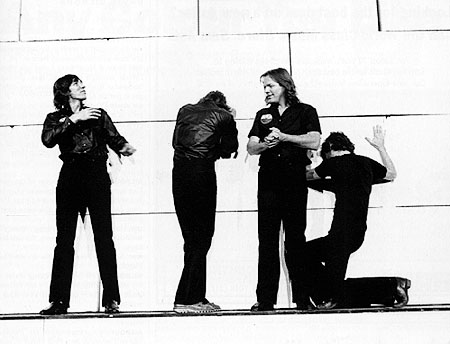 On the final date of the tour which promoted "Animals", Roger Waters was so enraged by the
rowdy behaviour of front-row fan that he beckoned him forward and spat in the unsuspecting
fellow's face. Horrified by his own aggression, Waters began to put together a concept album
about his feelings of isolation from the audience and the barriers which potentially exist
between all of us. "The Wall" is the result.
On the final date of the tour which promoted "Animals", Roger Waters was so enraged by the
rowdy behaviour of front-row fan that he beckoned him forward and spat in the unsuspecting
fellow's face. Horrified by his own aggression, Waters began to put together a concept album
about his feelings of isolation from the audience and the barriers which potentially exist
between all of us. "The Wall" is the result.
The work on the album started in 1977. Early in the recording of this album, Gilmour approached Waters with a complete instrumental song that he had played for the rest of the band. After listening to it, Waters said that he hated it and wouldn't have it on his album - he considered the music to be "childlike and simplistic". The rest of the band stood up for this song, and demanded that this song be included or they would walk. Reluctantly, Waters accepted. He put together the lyrics in less than half and hour. The song is "Comfortably Numb". Only two weeks after this fiasco, Waters "fired" Richard Wright and the band was now a trio.
"The Wall" was released in 1979, and met with world wide success, as did the movie production of the same name. A massive tour followed, as did the rumors from the media. A few people, who were ridiculed immediately for thinking so, saw the band breaking up soon.
In 1983, amidst the rumors of turmoil in the band, Pink Floyd released "The Final Cut". The name so ironically characterized the present status of the band. Some people, the rest of the band included, considered it to be a Waters "solo" album. On this album, no song was co-written with another band member. Indeed, much of the sound and emotion that gelled the band together seemed to be missing.
After a very punctuated tour and a U.K. mini-movie, no one heard from the band for two years. Then in late 1985, Waters left the band and immediately sued the remaining band members for exclusive rights for all the works of Pink Floyd, including the name. The fight was long and messy, lasting over a year. Finally, in 1987, a decision was made. The judge said that Waters had left the band of his own free will, and since the band never entirely broke up, the rights to most of the material belonged to what was left of the band. However, Waters did receive a partial decision in his favour. He was to receive royalties for what he had worked on. Neither side entirely satisfied, but it was over....
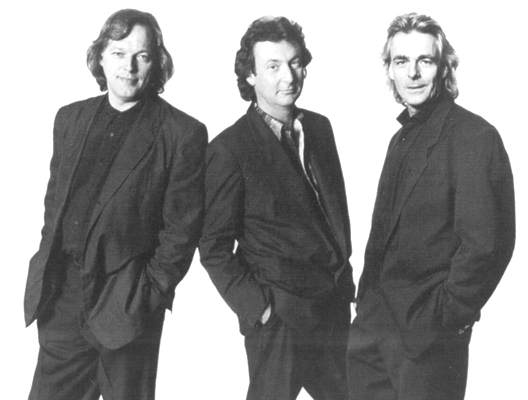 In September of 1987, Pink Floyd (Gilmour and Mason, with Wright as
a paid musician) released "Momentary Lapse of Reason". Originally intended
as a solo album for Gilmour, he wanted the album to be done as a whole.
Some fans embraced this new album, saying that the spirit of the band
was still alive. On the other hand, some fans turned their backs entirely
to this new project from The Floyd. A very successful tour followed,
though, and it seemed that the band was as popular as ever.
In September of 1987, Pink Floyd (Gilmour and Mason, with Wright as
a paid musician) released "Momentary Lapse of Reason". Originally intended
as a solo album for Gilmour, he wanted the album to be done as a whole.
Some fans embraced this new album, saying that the spirit of the band
was still alive. On the other hand, some fans turned their backs entirely
to this new project from The Floyd. A very successful tour followed,
though, and it seemed that the band was as popular as ever.
Waters also was having success of his own. He released The Pros and Cons of Hitchhiking in 1984, Radio K.A.O.S. in 1987, and Amused to Death in 1992. The albums sold well, and had very sucessful tours. And when the Berlin Wall came down in 1989, Waters orchestrated a star studded performance of "The Wall" in a now unified Germany. Performers for this gala event included Bryan Adams, Thomas Dolby, Cyndi Lauper, and a very special appearance by the infamous Vera Lynn.
In 1994, The Pink Floyd released "The Division Bell", which went to No. 1 on the American charts. It is also the only Pink Floyd album to reach the No. 1 spot, both in UK and US. Although far from a Floydian concept album, "The Division Bell' has a general theme of communications gone wrong. Needless to say their have many a debate as to the "communications gone wrong" within the band or in general.
And through this deep and winding history there are still many things that are unknown. The wounds in the band run deep, and only time will tell of what is yet to come.





